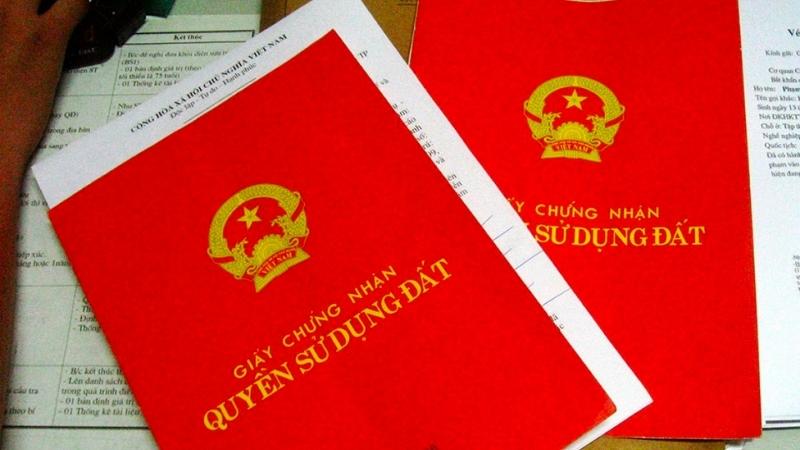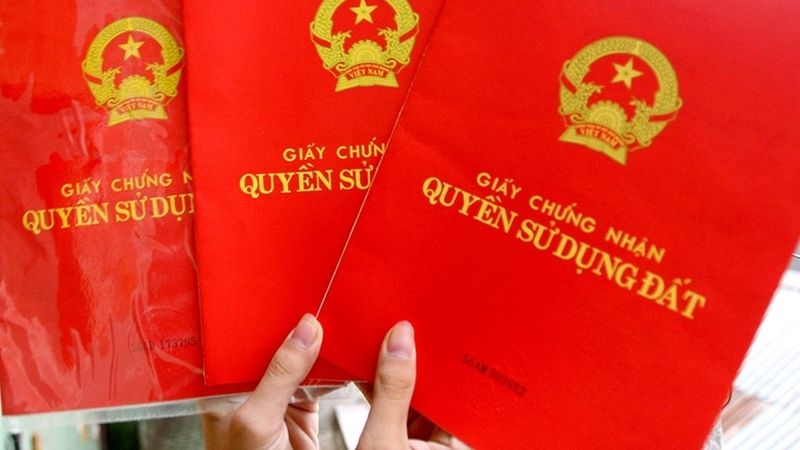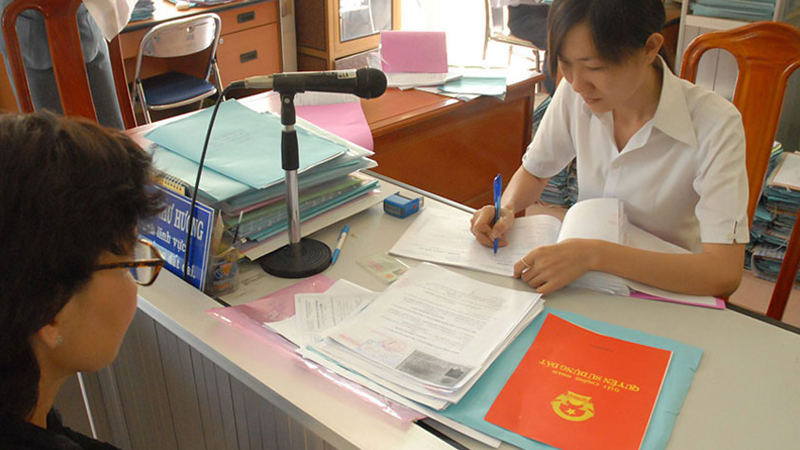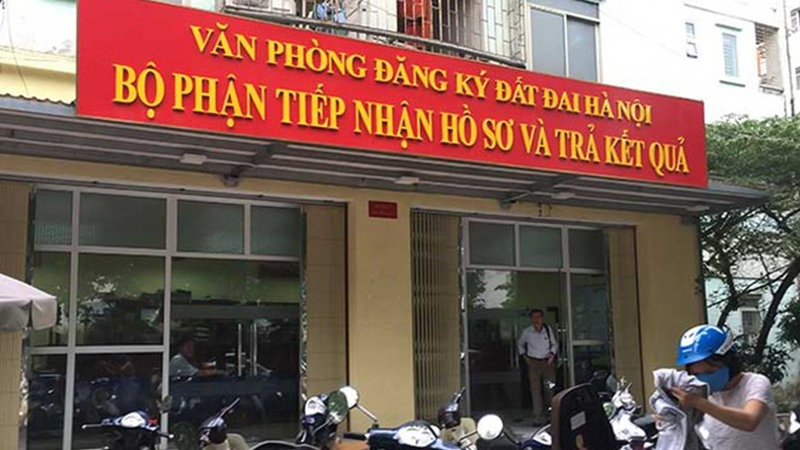In life, it’s not uncommon to encounter instances of land-use right certificate transfers, which may be carried out by parents, relatives, or extended family. However, do you truly understand this procedure well enough to apply it when necessary in the future? Let’s delve into the following article to gain a comprehensive understanding of the process.
Reference:
1. Understanding Land-Use Right Certificate Transfers
A land-use right certificate transfer is simply defined as the procedures for registering a gift, transfer, or inheritance of land-use rights (for land only), as well as land-use rights and assets associated with the land (including land, houses, or assets related to the land).
There are two scenarios for land-use right certificate transfers:
- Case 1: The recipient of the gift or land transfer will be issued a new land-use right certificate in their name.
- Case 2: The recipient of the gift or land transfer will not be issued a new land-use right certificate. In this instance, the information to prove the gift or land transfer will be reflected on pages 3 and 4 of the certificate, and the recipient will still retain all associated rights.
 Understanding Land-Use Right Certificate Transfers
Understanding Land-Use Right Certificate Transfers
Further Reference:
2. Requirements for Land-Use Right Certificate Transfers
Requirements for the transferring party
According to Clause 1, Article 188 of the 2013 Land Law, the party transferring the land-use rights must fulfill the following conditions:
- The land must be free from disputes.
- A land-use right certificate must be presented.
- The land-use rights must not be seized.
- The land must be within the permitted usage period.
 Requirements for Land-Use Right Certificate Transfers
Requirements for Land-Use Right Certificate Transfers
Requirements for the receiving party
Referring to Article 191 of the 2013 Land Law, the party receiving the transferred or gifted land-use rights must not fall under the following categories, which are not permitted to receive land-use right transfers or gifts:
- Organizations, households, individuals, religious communities, overseas Vietnamese, and foreign-invested enterprises are not permitted to receive land-use right transfers or gifts in cases where the law prohibits such transfers or gifts.
- Economic organizations are not permitted to receive transfers of land-use rights for rice land, protective forests, and special-use forests from households or individuals, except when the land-use purpose is changed according to the approved land use planning and plan.
- Households and individuals not directly engaged in agricultural production are not permitted to receive transfers or gifts of rice land.
- Households and individuals are not permitted to receive transfers or gifts of land-use rights for residential land, agricultural land, or land within protective forests and strict protection sub-zones of special-use forests, unless they reside in those protected forest or special-use forest areas.
Further Reference: Latest in 2022: Procedure and Fees
3. Steps for Land-Use Right Certificate Transfers
One of the most crucial procedures related to the “red book” is the “land-use right certificate transfer.” It encompasses three primary steps.
In this step, the necessary documents to be prepared by both parties are based on Articles 40 and 41 of the 2014 Notary Law:
For the selling/gifting/donating party:
-
Land-use right certificate (red book)
-
Identity documents: Identity card, citizen identification card, or passport (for both husband and wife)
-
Household registration book
-
Documents proving marital status (marriage certificate)
-
Power of attorney (in case of selling on behalf of someone else)
For the buying/receiving party:
-
Identity documents: Identity card, citizen identification card, or passport
-
Household registration book. Documents proving marital status
 The first step in transferring the land-use right certificate is to notarize and authenticate the transfer, gift, or donation contract
The first step in transferring the land-use right certificate is to notarize and authenticate the transfer, gift, or donation contract
Additionally, both parties can agree to prepare additional contracts and request forms for notarization (usually filled out by the buyer according to a prescribed template).
Regarding financial obligations:
-
The seller typically pays personal income tax.
-
The buyer usually pays the registration fee and file evaluation fee.
Nonetheless, the fees/taxes can be agreed upon by both the buyer and the seller regarding who will pay. In certain cases where personal income tax and registration fee exemptions apply, it is still necessary to submit tax and fee declarations.
The fees/taxes can be agreed upon by both the buyer and the seller.
Regarding the transfer application, the following documents need to be prepared:
-
Registration form for changes (Form No. 09/ĐK)
-
Transfer or gift contract
-
Original land-use right certificate
-
Personal income tax declaration form (Form No. 03/BĐS-TNCN)
-
Documents proving eligibility for tax exemption (if applicable)
-
Original registration fee declaration form (Form No. 01)
-
Documents proving eligibility for registration fee exemption (if applicable)
 Submitting the transfer application for the land-use right certificate
Submitting the transfer application for the land-use right certificate
Submission location
-
Land Registration Office branch in the district, town, provincial city, or one-door-service section where the land is located
-
Households and individuals can submit their applications at the People’s Committee of the communal level (commune, ward, town) where the land is located, if they so desire.
 Hanoi Land Registration Office
Hanoi Land Registration Office
Regarding the acceptance, processing, and delivery of results
-
After receiving the application, the district-level Land Registration Office will forward the information to the tax authority to determine the financial obligations. – Once the tax and fee payment notification is received, proceed with the payment as per the notification.
-
The Land Registration Office will confirm the transfer or gift information in the Land Register and make the necessary annotations in the land-use right certificate.
-
According to Clause 40, Article 2 of Decree No. 01/2017/NĐ-CP, the time limit for executing this procedure is no more than 10 working days from the date of receiving a valid application, and no more than 20 working days for mountainous, island, remote, or economically and socially difficult or extremely difficult areas.
4. Consulting on Land-Use Right Certificate Transfer to Father after Mother’s Death
According to Article 651 of the 2015 Civil Code:
1. Heirs by law are determined in the following order:
a) The first order of heirs includes: spouse, parents, and children of the deceased;
b) The second order of heirs includes: grandparents, full siblings, and grandchildren of the deceased, where the deceased is the grandparent;
c) The third order of heirs includes: great-grandparents, uncles, aunts, nephews, and nieces of the deceased; great-grandchildren of the deceased, where the deceased is the great-grandparent.
2. Heirs of the same order shall inherit equal shares of the estate.
3. Heirs of a subsequent order shall inherit only if there are no heirs of a prior order, or if the heirs of a prior order have no right to inherit or have waived their right to inherit.”
 If the mother passes away without leaving a will, the estate will be divided among the first-order heirs
If the mother passes away without leaving a will, the estate will be divided among the first-order heirs
In the event that the mother passes away without leaving a will, the estate will be divided among the first-order heirs, including the children, the husband, and the mother’s parents, with each receiving an equal share.
The following documents should be prepared for the procedure at the Land Registration Office under the district-level Department of Natural Resources and Environment where the land is located:
-
02 registration fee declarations
-
02 personal income tax declarations
-
Inheritance acceptance declaration
-
01 original land-use right and ownership certificate for houses and other assets attached to the land.
-
01 certified copy of the mother’s ID card and household registration book.
-
Additionally, in this case, you need to provide documents proving the kinship between the giver and the recipient to be eligible for personal income tax exemption.
-
Application for registration of changes
Land-use right certificate transfer fees include: Administrative fee of VND 15,000/case; Evaluation fee of 0.15% of the value (transfer value) of the transfer (minimum of VND 100,000 to a maximum of VND 5,000,000/case). After paying the fees, the land-use right certificate will be issued.
5. Consulting on Land-Use Right Certificate Transfer to Mother after Father’s Death
The procedure for transferring the land-use right certificate to the mother when the father passes away without leaving a will includes the following steps:
Subsequently, the mother should bring the land-use right certificate, the father’s death certificate, the power of attorney, a copy of the household registration book, ID card/citizen identification card, and the family meeting minutes to the People’s Committee of the commune, ward, or town, or the Land Registration Office to initiate the procedure.
- Application for registration of changes.
- 02 personal income tax declarations.
- 02 registration fee declarations.
- Inheritance acceptance declaration.
- Inheritance distribution agreement.
- 01 certified copy of the mother’s ID card and household registration book.
- 01 original land-use right and ownership certificate for houses and other assets attached to the land.
- Documents proving the kinship between the giver and the recipient to be eligible for personal income tax exemption.
































